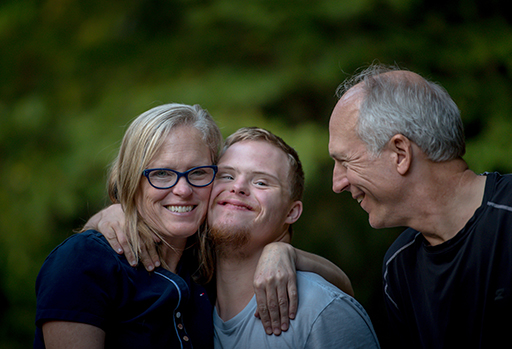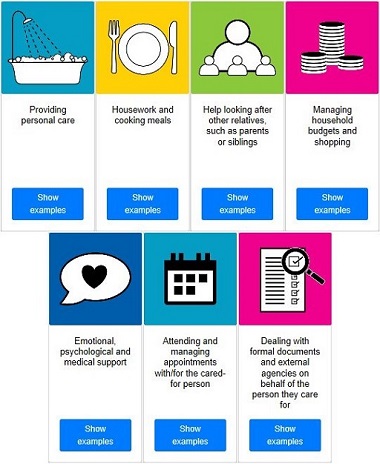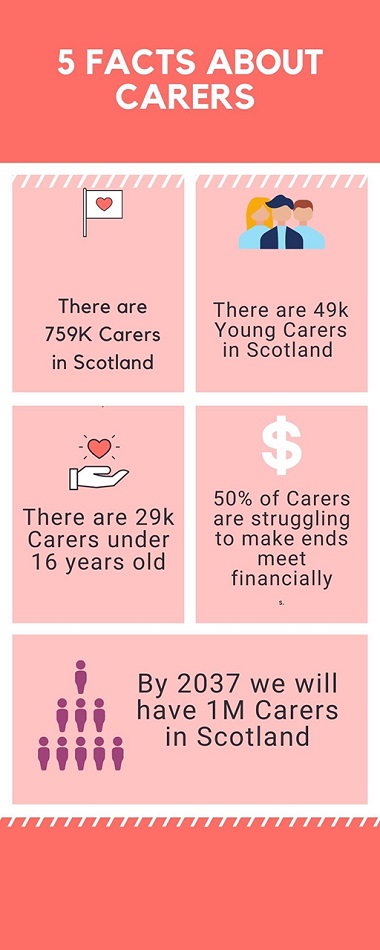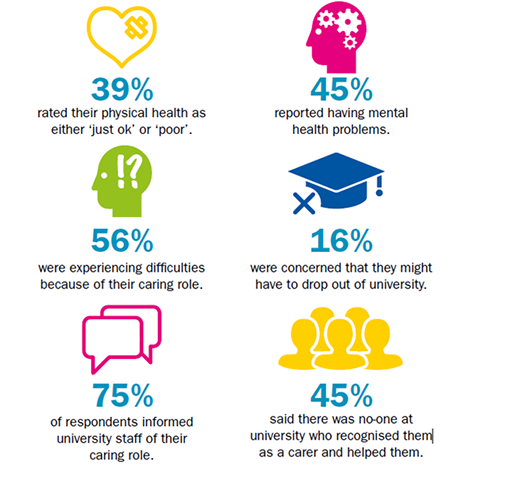Use 'Print preview' to check the number of pages and printer settings.
Print functionality varies between browsers.
Printable page generated Monday, 29 April 2024, 1:28 PM
Section 1: Becoming carer aware
Introduction
Welcome to Section 1 of the Carer Aware at University course. This section will give you an opportunity to hear directly from carers around the kind of responsibilities they have and the impact of caring on their health and wellbeing. It will also cover Scottish legislation and policy that relates to carers.
All university staff can make a difference to the experience and success of a student carer’s university journey. Recent research into the Student Experience in Scotland, carried out by Carers Trust Scotland, tells us that carers really benefit when staff understand the challenges they face in balancing university and home life.
Section learning outcomes
On completing this section, you will be able to:
Demonstrate an awareness of who student carers are and what they do.
Identify student carers in your university.
Provide an informed response when engaging with a student carer.
Support student carers to manage their health and wellbeing or signpost them to appropriate support.
Reflect on your own practice and how you can contribute to better outcomes for student carers.
Now go to 1.1 Who is a carer?
1.1 Who is a carer?
Carers Trust Scotland and the Scottish Funding Council define a carer as:
Anyone who provides unpaid care, for a friend, partner or family member, who due to illness, frailty, disability, a mental health problem or an addiction cannot cope without their support.
We recommend you use this definition in your institution to maintain consistency and clarity.
Activity 1.1 Reflection
Three in five of us will become carers at some point in our lives (Carers UK, 2020) so caring may well be very close to home for you. As you go through the course, please take a moment to reflect on your own life and people you know. What is your experience of caring and what impact has it had on you or the lives of those around you?
Make some notes in the text box below or in your learning journal if you’re using one.
1.2 What do carers do?
Carers are of course individuals, so will have different experiences of caring. In the following video, Hannah, Steven, Charlotte and Rebecca talk about their caring roles.
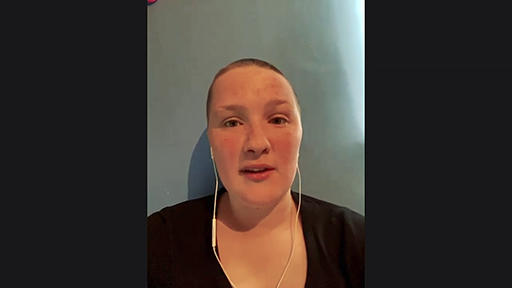
Transcript: Video 1.1 The role of a carer
The student carers in the videos have different caring roles and care for family members with different conditions and support needs. Unpaid carers can have many different roles and responsibilities, which can vary in length of time and impact.
Activity 1.2 The role of a carer
Click on the image below then click on ‘Show examples’ on each care category card to see a list of tasks that carers may carry out.
Take a few moments to make notes in the text box below or in your learning journal if you’re using one.
Facts about student carers
Now you’ve met some of the student carers who have generously shared their stories. You’ll be meeting them again as you work through the course.
Here are some of the things you should know about carers:
- Anyone, regardless of age, gender or socio-economic status that can become an unpaid carer at any time in their life, and their caring role can change over time.
- Not all unpaid carers identify as such or recognise that they are a carer.
- Being a carer can be for a short or long period of time.
- A carer may provide care for more than one person.
- Caring is not a Monday to Friday, 9 a.m. to 5 p.m. role.
- Caring can impact carers in different ways. There is no such thing as a typical carer.
- Carers are often a hidden and seldom heard group. Many are worried about disclosing their caring responsibilities.
- Carers have a range of transferable skills and knowledge.
1.3 Health and wellbeing
Earlier in this section, you heard from carers talking about the kinds of roles or responsibilities they have in their caring role. Understanding the range of experiences carers have will help you to develop supportive strategies to keep student carers in university and on a successful path.
Now let’s look at how caring might affect a carer’s health and wellbeing.
[Caring] can often lead to us being more isolated from our peers as they simply cannot empathise with the often traumatic situations we have come from.
Now let’s hear from Rebecca again as she talks about the impact of her caring role on her wellbeing while at university in this video.
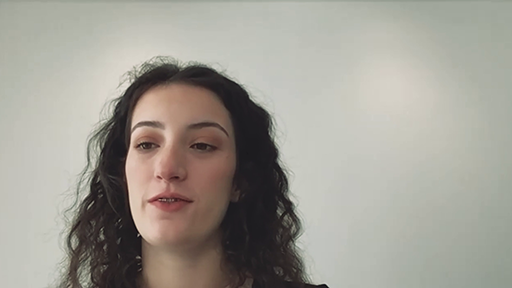
Transcript: Video 1.2 My caring role and the impact on university
[My caring role and the impact on university]
[The emotional impact of caring while at university]
Activity 1.3 Supporting student carers
Having watched Video 1.2, what kind of changes could you help put in place to support student carers like Rebecca in your institution? Make some notes in the text box below or in your learning journal if you’re using one.
Here are some examples to get you started:
- Simplify an existing system or process.
- Raise awareness with colleagues or carers.
- Build internal partnerships with colleagues or externally with other institutions or organisations.
- Add resources to the carer page on your website.
- Share health and wellbeing information on social media or through your student carer networks.
1.4 Legislation and policy related to student carers
As a staff member who works either directly or indirectly with student carers it is useful to be aware of key pieces of legislation and how they protect carers’ rights in law, explicitly or implicitly. These are:
Carers (Scotland) Act 2016
- Equality Act (2010)
Carers (Scotland) Act 2016
The Carers Act is intended to ensure consistent support for carers and young carers. It is designed to support carers’ health and wellbeing and help make caring more sustainable. Measures include:
a duty for local authorities to provide support to carers, based on the carer’s identified needs which meet the local eligibility criteria
a specific adult carer support plan (ACSP) or young carer statement (YCS) to identify carers’ needs and personal outcomes
a requirement for local authorities to have a service for carers which provides information and advice on, amongst other things, emergency and future care planning, advocacy, income maximisation and carers’ rights
a requirement for the local authority to consider whether that support should be provided in the form of a break from caring (Care Information Scotland, 2020).
A provision of self-directed support (Self Directed Support Act 2013) is also included.
Some of this support may already be in place for your student carers if they are eligible for it. If it is, the university can provide complimentary support that enables your students to balance their caring responsibilities with their studies and have a life alongside caring.
If students don’t have any of this support in place, you can advise them of their eligibility and encourage them to contact their local authority, local carers’ centre or scotland@carers.org
Equality Act (2010)
While caring is not named in the Equality Act 2010 as one of the protected characteristics, it provides some protection against discrimination or harassment because of caring responsibilities. This is because carers are ‘associated’ with the person they care for who is protected, for example because of their age or disability (Gov.uk, 2020).
We will explore the Equality Act and discrimination by association in more detail in Section 2.
Activity 1.4 Your Equality, Diversity and Inclusion policy
Your university will have an Equality, Diversity and Inclusion policy that reflects its commitments under the Equality Act. Have a look at the policy. Does it mention carers specifically?
Make a note of what it says in the text box below or in your learning journal if you’re using one.
Outcome Agreements
In addition to the legislation that protects carers, students are supported by recommendations from the Scottish Funding Council (SFC) that relate to carers in higher education. The SFC outline their expectations through an Outcome Agreement with each college and university.
What is an Outcome Agreement?
Outcome Agreements set out what colleges and universities plan to deliver in return for their funding from us. SFC Outcome Agreement Managers work with institutions to develop their Outcome Agreements.
SFC recognises student carers as a group ‘at risk’ of not achieving their full potential, from aspirations through to successful outcomes and employment.
The SFC undertakes an annual Outcome Agreement process that provides a mechanism for universities to report on the impact institutional strategies have on a number of groups, including student carers.
The SFC lay out the following recommendations to universities in relation to their responsibility towards student carers:
- Universities will continue to improve support for students and staff with caring responsibilities.
- Universities should use Carers Trust Scotland’s definition of a carer and be encouraged to work in partnership with Carers Trust Scotland.
- Universities are encouraged to fully support and participate in the Carers Trust Going Higher for Student Carers: Recognition Award.
- Institutions are required to publish a Student Carers Policy and are recommended to have a signed Student Carer Statement of Intent.
- Student carers should have the same level of support as care-experienced students as per the university’s corporate parenting responsibilities.
- Universities should provide a named point of contact for student carers for advice and support from the point of entry through to graduation.
- Universities should have a dedicated webpage outlining the support available to student carers and how to access it.
- Universities should include carers in their widening participation and outreach work.
- Universities should include carers in their contextualised admissions policy.
(Scottish Funding Council, n.d.b)
The SFC endorses the Carer Positive award, operated by Carers Scotland, which demonstrates a commitment from employers in providing carer friendly policies and working practice.
(Carer Positive, n.d.)
Conclusion
In this section we got to know Hannah, Charlotte, Stephen and Rebecca, who shared their experiences of caring while studying and the impact of caring on their health and wellbeing. We also looked at the legislative and policy context which supports student carers in Scotland.
We hope this section has given you an insight into the experiences of student carers and an understanding of the support they may need to access, participate and succeed at university. You should feel better equipped to recognise student carers and signpost them to support available within and outside the university.
In Section 2 you will explore the impact of caring on the student journey and the barriers and opportunities a caring role can create.

